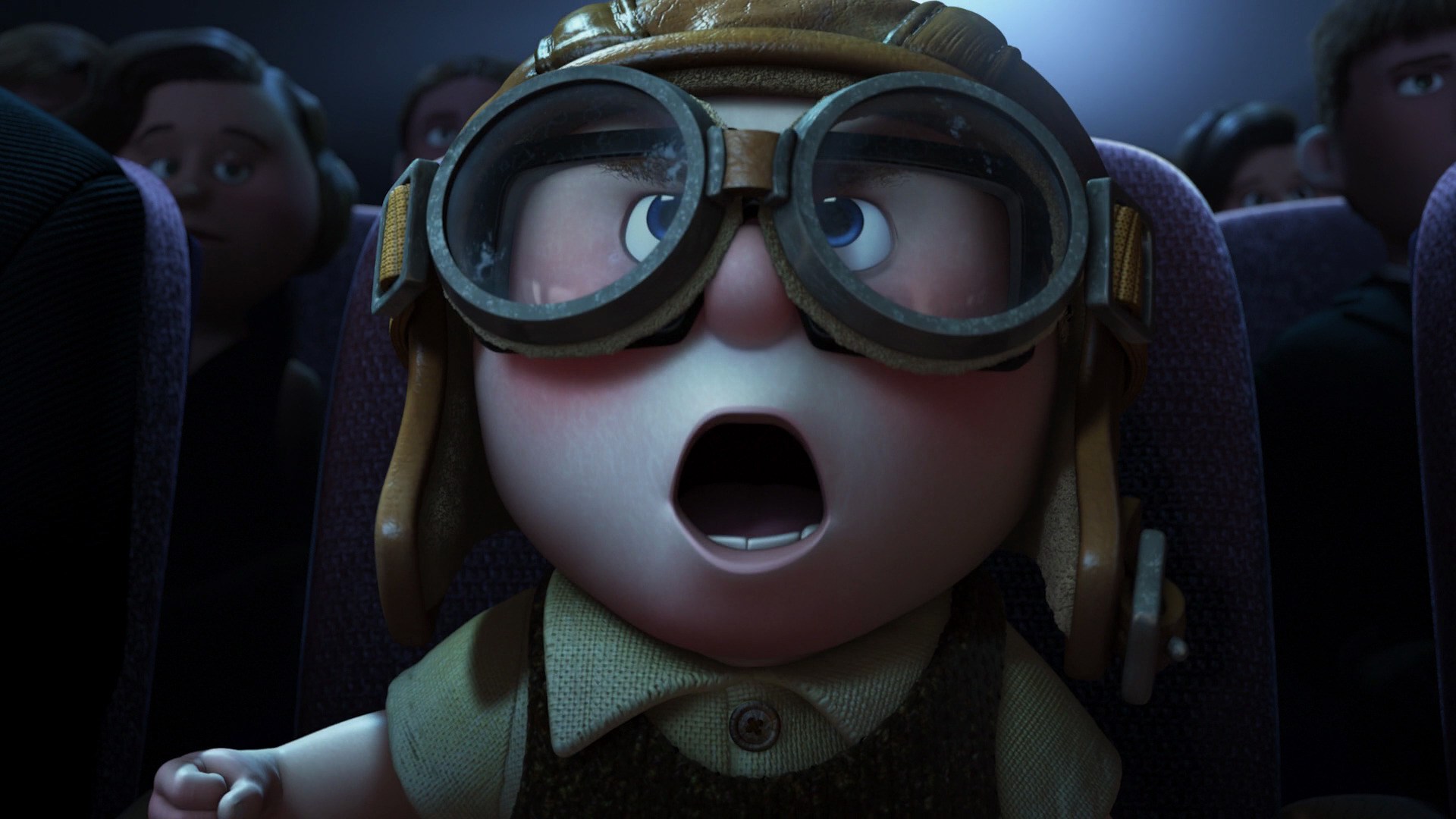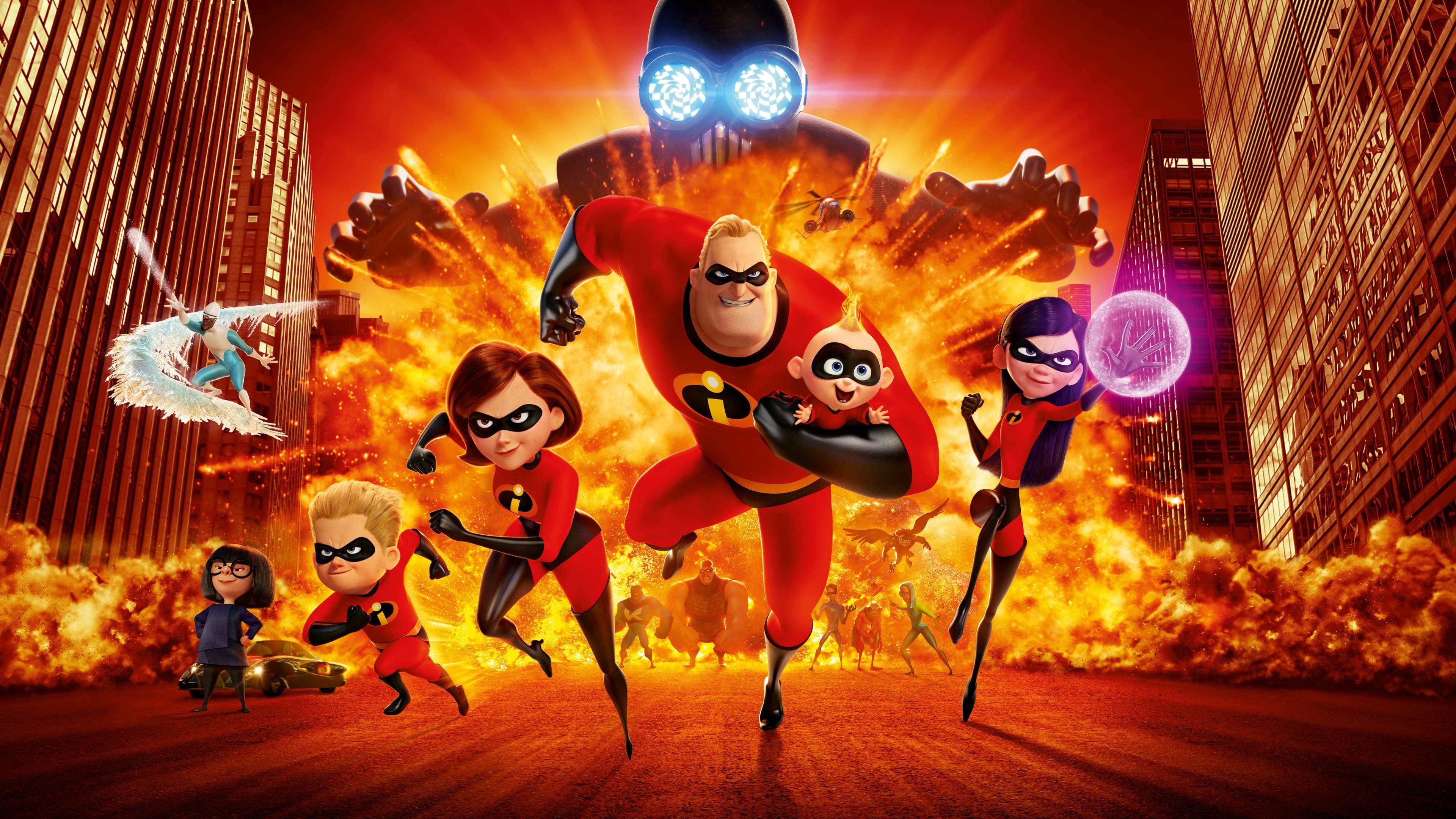If you follow Brad Bird on twitter, (and if you don’t, you really should, he’s a riot), you’ve probably noticed that he’s responded to some complaints about the nature of Incredibles 2. With its PG rating, the film contains the superhero violence we see in all manner of live action films (significantly toned down) and just old fashioned cartoon violence, somewhat heightened. But fans, mostly parents of young children, have another gripe; the film’s language. Apparently, characters saying ‘I’ll be damned’ and ‘what the hell’ is unacceptable in a children’s film. And as Bird has continuously repeated, both on twitter and off, animated films are not solely for children. (Never mind the fact that the first Incredibles features a suicide attempt and references to marital infidelity, but that’s another topic for another day).
Your trio of Upcoming Pixar writers are here to straighten some of these misconceptions out.
Joanna: Children deserve quality entertainment, after all.
This phrase is a little predictable in these discussions now, but only because it’s a fact: animation is a medium, not a genre. Animated movies are just that – movies that are animated. Saying that animated movies are for children is just as ludicrous as saying that movies in general are for children. This statement isn’t wrong exactly – there are movies, and animated movies, made with children in mind – but it’s failing to take into account the impressive variety of films that have been created through animation.
I loved watching Watership Down as a kid, but it gave me nightmares. Watership Down was not made into an animated movie to appeal to a younger audience – animation allowed the film-makers to bring a very surreal story to life. That’s what makes animation such a magical and unique medium: you can create entirely new worlds; imagination can become a tangible thing; rabbits can speak! As a kid, I liked watching the rabbits in Watership speak. I did not like watching the fields slowly turn to blood, or rabbits getting horrifically trapped and slowly choking to death. This is not a movie for kids. I think my parents were also under the impression that animated movies were automatically filed under the ‘okay for my kids to watch’ category, because I also remember watching Animal Farm (1954) a lot. Once again – I enjoyed watching the animals talk, but the political messages went right over my head.
Even though I’m arguing that animated movies are for everyone, not just children, I think it’s worth noting that animated movies that have been made with young kids as their target audience shouldn’t be looked down upon. Studio Ghibli’s Hayao Miyazaki famously creates his movies to inspire children, and I think this is what makes them so pure and moving. Ghibli movies have simple messages, but never stray away from tackling important issues. They don’t patronise their audience.
Pixar movies aren’t exactly directed toward any age in particular – they’re made for everyone to enjoy. I love that I can watch a Pixar movie with my entire family, from younger cousins to an elderly grandparent, and there’s something in there that resonates with each and every one of them.
Simoa: Respect animators and their work.
When I was twenty years old, I revisited Pinocchio (1940) for the first time in years. I think I had only caught fragments of it when I was a child. This time, I knew I’d appreciate it more because I was going to pay attention to the full thing. I not only appreciated the film, I was also grateful that I’d never watched all of it when I was young.
Pinocchio is a frightening movie. It probably would have given me nightmares. I didn’t go to the movies often in my childhood. It was the age of VHS and I had an impressive collection of classics: Aladdin, The Lion King, Pocahontas, Mulan, Toy Story, and A Bug’s Life to name a few. These movies were treasured in my childhood and still were as I got older. When I watch those films now, it’s not because of nostalgia or because I want to feel like a kid again. I watch them because they’re good movies.
I hadn’t grown up watching the Disney films of the 1940s and 1950s. They’re stunningly animated with awe inspiring moments of beauty and terror. Like fairy tales, the wicked in these films are punished gruesomely. And in a film like Bambi, the elements of nature are harsh and unrelenting, while the evil force that must be reckoned with is man’s cold disregard for other living animals. Yet films like Bambi and Snow White are derided as childish while the Disney films of the 1990s are praised for their adult appeal. Why exactly is that? There were talking animals in the older Disney films, but they didn’t dominate the films or the marketing, nor did they seem shoehorned in, like much of the comedic sidekicks of the renaissance period.
Take 1996’s The Hunchback of Notre Dame for example. Were the three talking gargoyles added to entertain the adults? No, they were there for the children, maybe because they provided comic relief in a dark tale about racism and persecution. But the gargoyles don’t provide much of a distraction at all. Can you imagine characters like that in Bambi or Pinocchio? Or in a Ghibli film? The films of Hayao Miyazaki and Isao Takahata are brimming with moments so lovely they almost ache. Those films deal with tragedy, loss, war, and illness, not unlike live action ones. Grave of the Fireflies (1988) is certainly not a children’s film, and anyone who feels differently ought to have serious discussions with children about war, violence, and trauma before allowing them to watch it. But it’s better to wait until they’re older so they can appreciate the magnitude of such a film.
Walt Disney didn’t make films exclusively for children but he still had a profound respect for them and knew they were part of his audience. He didn’t believe in dumbing anything down for children. People either think animated films should be sanitized so they’re suitable for children (as all the complaints against Incredibles 2 illustrate), or that all animated films are for children only, with some clever insinuations added for the adults.
Many people think we need more R rated animated films in the vein of Anomalisa and Sausage Party. What we need is more respect for this medium and the artists who work tirelessly to bring these stories to life.
Nia: Being amazed that a “children’s film” produced an emotional response in you is pretentious.
“Animation is for children,” she said, rolling her eyes and scoffing, “why don’t you pick another profession? Something more… respectable.”
These are the words I’ve heard for practically my entire life. Mostly from family, sometimes from friends, when I would profess my adoration for animation and my hopes and dreams of one day working in the industry I loved so much. Whenever I defended animation and explained why I could see myself doing nothing else, it would always end in a sarcastic, “well, good luck,” before they hastily changed the subject.
I can happily say I’ve worked in the industry now for over 3 years, but despite that achievement, I still haven’t been able to escape those condescending words. My family might’ve stopped making an effort to point that out, but upon going on twitter or reading reviews of animated films, the claim that animation is only for children persists. Reading how people still think that makes my blood boil and the hairs on my arms stand as tall as trees. I often catch myself having to do a triple-double take as I try to comprehend what I just read. How do people still not get it?
Animation as a preferred medium doesn’t mean the storytellers and directors involved in an animated film didn’t have intentions to make bigger impacts with their film. They just wanted to use the medium of animation to tell their story; just as all the writers and directors have been using live action as their tool for years. Like theater, novels, and so on, animation is an art form. It’s a medium within itself, another means of telling a story. There are so many more possibilities as to what animation can achieve, especially now with all the growing technological advances.
What I don’t understand is why do people have to feel ashamed for liking an animated movie, even when it’s slightly more mature and has adult themes? Why does going to the cinema alone, without children, to watch an animated film make people so uncomfortable? Why do people still make excuses as to why they felt emotional during a certain scene in a cartoon? Why can’t people just accept animation for what it is: a medium for ALL, and not inclusive to just children? Can’t we all still have a little bit of fun in our adult lives? What happened to all the whimsicality in our hearts? Yes, we’re all adults, but we were also children once.
When Paddington 2 was released earlier this year, I didn’t hear people making excuses when they fell in love with the sequel or the adorable Paddington himself. “I know this movie was for kids but man, I cried my eyes out!” Instead of reading those words all over twitter, which is usually what’s directed towards any Disney or Pixar film, it was praised for its story and visual elements. (Worth noting that Paddington 2 director Paul King was inspired by Pixar when making his film).
So much work goes into making an animated film, artists spend years of their lives putting detail into every single shot that’s on screen; everything is created from scratch and animation deserves the same amount of respect that goes to literally every live action film churned out by Hollywood; yes, even deserving to sit amongst the slew of Marvel films that are just never going to end.
Call me crazy, but I can’t wait for the day animation is finally respected and treated for what it is: another way of telling a story and captivating audiences all over the world. I even look forward to the day it wins the Academy Award for Best Feature. It can most certainly be done, but the question is, how long will it take?
The kids only table


Simoa
Simoa (Elliefredricksen) is Editor in Chief of Upcoming Pixar and an aspiring Pixar heroine. She joined Upcoming Pixar in 2014 and is always excited to see how her favorite animation studio changes and grows.





I agree completely that animation is a multi-faceted genre that people need to embrace for it’s artistry and not simply assume an animated film is only for children. I never tire of animation regardless of content. Like you I grew up with Watership Down, Animal Farm, Lord of the Rings and even some of Ralph Bakshi’s tamer work like Wizards. Most of these certainly weren’t suitable for my age bracket but deemed OK simply because it was animated. No adult in my household watched them before me, or with me. None of that detracts from what great works I view them as now that I’m an adult.
I also feel that it’s ridiculous that people feel the need to complain about something like this. Few animated films contain anything worse than most children hear or see from their own parents and family and not being able to see a movie due to it’s age restriction is a simple fact of life.
However, I think if animation is truly to be taken seriously by adults the marketing of animated films needs to be adjusted. I am a huge fan of Pixar and animation in general and my 50th birthday is fast approaching. With that in mind I’m very much aware that Incredibles 2 is targeted at kids. This list of companies currently promoting The Incredibles with their product lines is large and diverse with Clorox, Chrysler, ADT, and Alaska Airlines signed up as partners. However among those is McDonald’s with Incredibles-themed Happy Meals. No doubt Disney also has a significant new toy line to be released in conjunction with the movie. It is very difficult to tell kids that they can have a Happy Meal or pick up a new MR. Incredible action figure but that they are still too young to watch the movie.